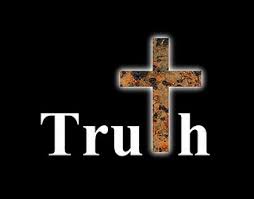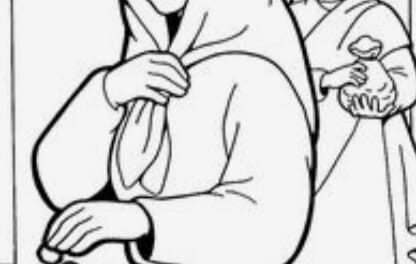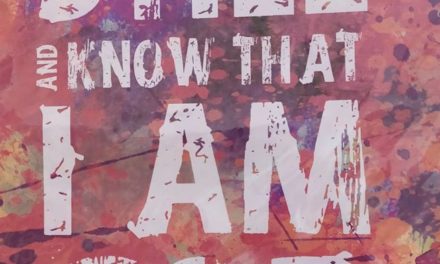Truth has been on trial for the past 2000 years especially with reference to the Passion narrative. The Roman governor Pontius Pilate’s famous cynical reply ‘What is truth,’ to Jesus’ assertion that ‘everyone who belongs to the truth listens to my voice,’ is a helpful and a defining question for our secular culture. (John 18:38). It is apparent that while recognising the truth, Pilate chose to reject it. Where are the Pilates of our time? Today, many people sound a lot like Pilate, a kind of Pilate syndrome and feeling, free of all guilt, turning from truth and perpetuating lies including ongoing denial of the Lordship of Jesus Christ. The reflection is that when there is no basis for truth, there is no basis for moral/spiritual right and wrong. Biblical truth is ‘a lamp to my feet and a light to my path,’ with potential to illuminate every secular idols and darkness of this age (Ps 119:105).
The resistance to Jesus Christ by Jesus Seminar, the pretensions of the ‘new atheism’ of Richard Dawkins[1] and other postmodern credos could be traced to a single source, ‘a cognitive idolatry that divinizes creation and absolutizes the works of the human mind.’ According to Angus Menuge, ‘the result is a variety of reductionist schemes that falsify the facts, contradict themselves and promote doublethink.’[2] The Church needs to proclaim the real truth to overcome the present captivity by the mental and religious idols of the world, false worldviews or philosophies of life, and Pilate syndrome. Due to conflict of life and conflict with God, many have become so religious by making ‘a God-substitute from some dimension of God’s good creation.’
Every idols have consequences. The idol that Eve and Adam obeyed by choosing their own way instead of God’s way led to their expulsion from the Garden of Eden. The freedom God gave them was with a prohibition, a test of obedience to the truth and they failed it.[3] Humanity still shares in the curse of their failure and its consequences (Rom 1:21). It is also on record that Pilate committed suicide, a ‘reminder for everyone that ignoring the truth always leads to undesired consequences,’ and sad end. It is a greater tragedy when we recognise the truth but fail to heed it. The reflection is that when we dishonour God or His Word, we dishonour ourselves. Thanks to God for Jesus Christ. It is in the light and truth of Jesus Christ that all the treasures of wisdom and knowledge are hidden. Truth is God in the flesh, hence it is the mandate of the Church to show how the biblical truth is more convincing than competing worldviews bearing in mind that ‘the gospel is the highest love for human being. The gospel is the key that fits the lock of the universe.’[4] I think this is where Methodism, as a movement shaped by One Book – The Bible, could provide a renewed inspiration for the incoming global renewal and revival.
Alison Morgan explained that ‘truth, in God’s economy, is much bigger and more powerful than just words as we commonly think of them.’ According to her, ‘it is easy for us, the heirs of modernism, to trivialise truth, to reduce it to information.’ Morgan reference to Mahatma Gandhi statement on the truth provides a good reflection for us: ‘You Christian look after a document containing enough dynamite to blow all civilisation to pieces, turn the world upside down, and bring peace to a battle-torn planet. But you treat it as though it is nothing more than a piece of literature.’ The argument is that ‘truth comes in words … the words of God is in the Bible. The Bible is the word of God, written down – that is what ‘scripture’ means.’[5]
In Roman chapter 1, Apostle Paul presented the Christian message focusing on the fact ‘that all people – everywhere and at all times – have access to evidence for God’s existence .. Through the created order: the things that have been made.’[6] The argument is that both physical and human nature give evidence for the Creator. Beyond the origin of biological information and DNA molecule, the message of general revelation (physical and human) in nature is that created things speaks of God (Rom 1:20; Ps 19:4). Based on our human nature, we all have capacity to suppress the evidence for God from creation because of what Calvin called ‘sensus divinitatis,’ – an innate sense of the divine. According to Paul, ‘they suppress the truth in unrighteousness… Although they knew God, they did not glorify Him as God nor were thankful, but became futile in their thoughts, and their foolish hearts were darkened …in the lusts of their hearts, to dishonour their bodies among themselves, .. who exchanged the truth of God for the lie … They did not like to retain God in their knowledge, God gave them over to a debased mind’ (Rom 1:18, 21, 24, 28). Human nature have the tendency to deny and ‘suppress thoughts that are painful, disturbing, or traumatic,’ and thereby create idols to take the place of God (Rom 1:23, 25). We all have a decision to make either to recognise the ultimate reality, God Almighty, the cause of our existence and salvation through Jesus Christ (Jn 3:16), or the uncaused source (Jos 24:15).
 The truth in the biblical context is the state of being in accordance with the ultimate reality, God Who became flesh in Jesus Christ, the ‘I am the Truth.’ The truth is about Jesus Who conquered the world, sin, and Satan. In John 16:33, Jesus said to his followers, ‘These things I have spoken to you, so that in Me you may have peace. In the world you have tribulation, but take courage; I have overcome the world.’ Jesus conquered the world not in the political context but, spiritually when he rose from the dead and return to heaven to be with the Father. Apostle Paul aptly described the world tribulation: For we do not wrestle against flesh and blood, but against the rulers, against the authorities, against the cosmic powers over this present darkness, against the spiritual forces of evil in the heavenly places (Eph 6:12). Spiritually, Jesus conquered for us the world of disease, hunger, sin, anger, hate, and death. Truth in Jesus conforms to ultimate reality in God’s power. The eyewitnesses wrote what they saw. They were with Him. They watched Jesus perform many miracles, heal the sick, cured the blind, feed the starving, walked on water, calm a storm with a command, and changed water to wine.
The truth in the biblical context is the state of being in accordance with the ultimate reality, God Who became flesh in Jesus Christ, the ‘I am the Truth.’ The truth is about Jesus Who conquered the world, sin, and Satan. In John 16:33, Jesus said to his followers, ‘These things I have spoken to you, so that in Me you may have peace. In the world you have tribulation, but take courage; I have overcome the world.’ Jesus conquered the world not in the political context but, spiritually when he rose from the dead and return to heaven to be with the Father. Apostle Paul aptly described the world tribulation: For we do not wrestle against flesh and blood, but against the rulers, against the authorities, against the cosmic powers over this present darkness, against the spiritual forces of evil in the heavenly places (Eph 6:12). Spiritually, Jesus conquered for us the world of disease, hunger, sin, anger, hate, and death. Truth in Jesus conforms to ultimate reality in God’s power. The eyewitnesses wrote what they saw. They were with Him. They watched Jesus perform many miracles, heal the sick, cured the blind, feed the starving, walked on water, calm a storm with a command, and changed water to wine.
Sin is contrary to human nature, hence Jesus died and rose to conquered sin (Rom 1:29-31). Jesus conquered Satan. The disobedience of Adam and Eve brought sin to the world, but Jesus Christ, the last Adam succeeded in defeating sin and Satan (Matt 4:1-11). At the Cross, Jesus defeated Satan and rose from the dead-breaking Satan’s power over fallen humanity (Heb 2:14). Jesus has defeated Satan through the lives of those who have believed in Him (Col 1:13, Rom 16:20). In Jesus’ second coming, He will have Satan bound and cast into the Lake of fire (Rev 20:1-2, 10).
The truth in Jesus Christ Who can never be separated from God, the unchanging changer is fixed and eternal, hence it makes us free from power of the world, sin and Satan. Using the words of Morgan, ‘it is untruth which causes us not to be free … Often the untruths … bind people…’ It is time to overcome human short-sightedness and stop viewing the ultimate reality through the lenses provided by secular culture and definition.[7] Truth in Jesus creates passion for souls. Truth heals, loves sinners but hates sin. Pilate syndrome reveals tensions between world powers and voice of truth. Truth is found in the person of Jesus Christ, hence, it is relational not doctrine or system. Remember, only the truth personified in Jesus Christ that transcends mere facts and debates can set you free from the world, sin and Satan.
[1] Andrews, Edgar, Who Made God?: Searching for a Theory of Everything (Darlington: EP Book, 2009), p. icp
[2] Menuge, Angus, in Pearcey, Nancy, Finding Truth: 5 Principles for Unmasking Atheism, Secularism, and other God substitutes (East Sussex: David C. Cook, 2015), pp. 3-4
[3] Andrews, Who Made God?, p. 245
[4] Kullberg, Kelly Monroe, in Pearcey, Finding Truth, p. 3
[5] Morgan, Alison, The Wild Gospel: Bringing Truth to Life (Oxford: Monarch Books, 2004), pp. 237-238
[6] Pearcey, Finding Truth:,p. 24
[7] Morgan, The Wild Gospel, p. 255











Yes Deji. Thank you. We as Christians have the Good News to publish on every platform available. The Good News is that truth. We must cherish the great gift we have; cherish it enough to proclaim it to the whole world. The transforming power it gives makes the sharing imperative. Yes, we have the Truth, the Good News, the Gospel to proclaim! The LORD is ready and eager to work with us and through us. His eagerness motivates and compels us!
Happy Reforming Saints day dad. Regards to mum. Pray for me, please.